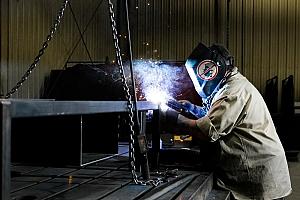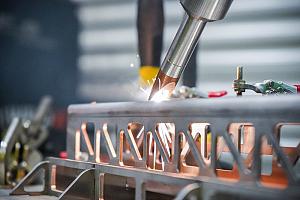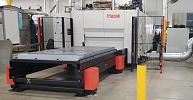Editor-in-Chief
- FMA
- The Fabricator
- FABTECH
- Canadian Metalworking
Categories
- Additive Manufacturing
- Aluminum Welding
- Arc Welding
- Assembly and Joining
- Automation and Robotics
- Bending and Forming
- Consumables
- Cutting and Weld Prep
- Electric Vehicles
- En Español
- Finishing
- Hydroforming
- Laser Cutting
- Laser Welding
- Machining
- Manufacturing Software
- Materials Handling
- Metals/Materials
- Oxyfuel Cutting
- Plasma Cutting
- Power Tools
- Punching and Other Holemaking
- Roll Forming
- Safety
- Sawing
- Shearing
- Shop Management
- Testing and Measuring
- Tube and Pipe Fabrication
- Tube and Pipe Production
- Waterjet Cutting
Industry Directory
Webcasts
Podcasts
FAB 40
Advertise
Subscribe
Account Login
Search
The gap between exact and real world
- By Dan Davis
- September 25, 2015
A recent conversation with a young owner of a fabricating shop turned to a reflection of how he got started in the business. He had grown up around fabricating and had ventured off to college, where he earned a degree in manufacturing technology.
One of the most important learning aspects of his college career was an internship he did for a midsized fabricator shop, which had been purchased by a serial entrepreneur with an engineering background. The intern was soon thrust into the position of chief scheduler and job programmer.
The experiences the young fabricator gained were unrivaled. The discussions he had with his highly intelligent boss with little metal fabricating experience would prepare him for future conversations with other engineers who have never stepped foot on a fabricating shop floor.
Here’s an example of one of those early conversations:
Business owner: “Why can’t we build fixtures to ensure that these weldments meet tolerances each and every time we do the job?”
Fabricator: “When you apply heat to metal, sometimes that changes the metal and causes things to be out of tolerance.”
Business owner: “So the metal is an issue?”
Fabricator: “Yes.”
Business owner: “Then we need a new source for metal.”
Fabricator: “It’s not that simple. Steel coming from mills isn’t exact from one lot to the next.”
Eventually the business owner came to understand the fabricating world, where tolerances are not going to be as exact as those used to build a rocket. That type of perspective comes with experience.
Unfortunately, this type of experience isn’t easily duplicated in the collegiate classroom. Engineering students might learn how sheet metal is made, but they aren’t going to understand why, for the most part, the first blank you bend on a press brake isn’t going to be a perfect 90-degree bend.
I visited a fabricator in Northern California several years ago, and he regularly hosted engineering students from local colleges, even Stanford. It’s not exactly the school outreach that organizations such as the Fabricators & Manufacturers Association regularly do, but that approach does make sense. If tomorrow’s engineers can’t replicate the metal manufacturing world inside their classrooms, metal fabricators can invite them into today’s shops to learn about how stuff is really made.
subscribe now

The Fabricator is North America's leading magazine for the metal forming and fabricating industry. The magazine delivers the news, technical articles, and case histories that enable fabricators to do their jobs more efficiently. The Fabricator has served the industry since 1970.
start your free subscriptionAbout the Author

Dan Davis
2135 Point Blvd.
Elgin, IL 60123
815-227-8281
Dan Davis is editor-in-chief of The Fabricator, the industry's most widely circulated metal fabricating magazine, and its sister publications, The Tube & Pipe Journal and The Welder. He has been with the publications since April 2002.
- Stay connected from anywhere

Easily access valuable industry resources now with full access to the digital edition of The Fabricator.

Easily access valuable industry resources now with full access to the digital edition of The Welder.

Easily access valuable industry resources now with full access to the digital edition of The Tube and Pipe Journal.
- Podcasting
- Podcast:
- The Fabricator Podcast
- Published:
- 04/30/2024
- Running Time:
- 53:00
Seth Feldman of Iowa-based Wertzbaugher Services joins The Fabricator Podcast to offer his take as a Gen Zer...
- Industry Events
Pipe and Tube Conference
- May 21 - 22, 2024
- Omaha, NE
World-Class Roll Forming Workshop
- June 5 - 6, 2024
- Louisville, KY
Advanced Laser Application Workshop
- June 25 - 27, 2024
- Novi, MI
Precision Press Brake Certificate Course
- July 31 - August 1, 2024
- Elgin,































